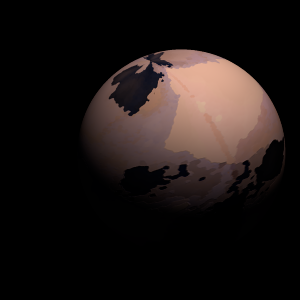|
|
Space Astro
|
Info for exoplanet "Esynat-a"
| Scientific (actual) data |
|---|
| Name | Kepler-1310 b |
| Planet status | Confirmed |
| Radius | 0.128 |
| Orbital period | 0.679336 |
| Discovered | 2016 |
| Updated | 2021-02-05 |
| Tconj | 2454970 |
| Publication | Announced on a website |
| Detection type | Primary Transit |
| Alternate names | 2MASS J18554080+4044244 b, K02668.01, KIC 5513012 b, KOI-2668 b, KOI-2668.01, WISE J185540.80+404424.2 b |
| Star name | Kepler-1310 |
| Right ascension | 283.92° |
| Declination | 40.74° |
| Mag j | 12.912 |
| Mag h | 12.516 |
| Mag k | 12.436 |
| Star distance | 583 |
| Star metallicity | -0.07 |
| Star mass | 0.91 |
| Star radius | 0.88 |
| Star age | 4.17 |
| Star temperature | 5549 |
| Star alternate names | 2MASS J18554080+4044244, KIC 5513012, KOI-2668, WISE J185540.80+404424.2 |
| Wikipedia article | Kepler-1310 b |
Back
| |
| Fictional info (?) |
|---|
| Suggested name | Esynat-a |
| Planet type | Cold planet |
| The polar regions are constantly below 252°K (-21°C).
The helium has probably photodissociated, and the free hydrogen deuteride (HD) has been swept into interplanetary space by the solar wind because of the lack of a planetary magnetic field. |
| Atmosphere | Hydrogen deuteride (HD) | 51% |
| Carbon monoxide | 20% |
| Helium | 16% |
| Oxygen | 10% |
| Formaldehyde | 2.3% |
| Neon | 0.046% |
| Carbonyl sulfide | 0.028% |
| Nitric oxide | 0.00032% |
| Carbon dioxide | 5.8E-5% |
| Atmospheric pressure | 80 bar |
 |
| No known satellites |
| Google search for Esynat-a |
|
Website by Joachim Michaelis
|
|
|
|